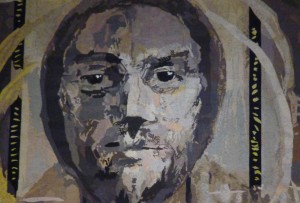 We all know that Christ, in taking on flesh, radically identified with humanity, from its highest of joys to its lowest of woes.
We all know that Christ, in taking on flesh, radically identified with humanity, from its highest of joys to its lowest of woes.
Yet is the work of the “beginning and end” of all things restricted to mere humanity?
Might the love which compelled Christ to hang upon the cross, actually have cosmic consequences for the whole created order?
Christ and the Animals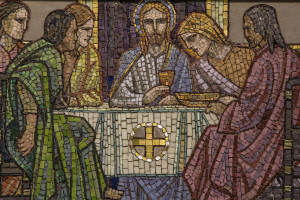
The Lamb of God
The Lion of Judah
The Shepherd of the sheep
Christ has always had a special association with animals.
In the Gospels, there are numerous accounts which show Jesus coming alongside and identifying with the world of non-human life.
Traditionally, Christ’s birth takes place in the home of sheep and oxen.
As His ministry begins, he spends time in the wilderness “with the wild beasts” (Mark 1: 13).
A humble donkey is ridden upon His triumphal entry into Jerusalem (Matt 21. B-6).
Christ affirms it to lawful and righteous “do good” on the Sabbath which includes the rescuing of an animal which has fallen into a pit (see Matt 12.10b-12)
God’s tenderness and compassion extends to all His creation so that whilst “foxes have holes, and birds of the air have nests; but the Son of Man has nowhere to lay his head” (Luke 9.58).
We are reminded that sparrows, sold but for a few pennies are “not forgotten” by God. (Luke 12:6)
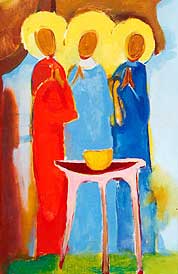 The Word Made Flesh
The Word Made Flesh
The love of God was revealed and dwelt among us in the person of Christ who is described in the opening verses of John as the Word, the beginning and end of all things.
In entering the world, it is said the “Word became flesh”. (John 1: 14)
Flesh, or sarx in the original Greek (a term which refers both to human and non- human life), is the substance God chose to reveal Himself through.
This substance allows for a conscious, creaturely connection with the world of existence.
It is the medium within which all creatures “feel” their way around material reality and allows humans and animals alike to exercise their volition and interact with the rest of the world.
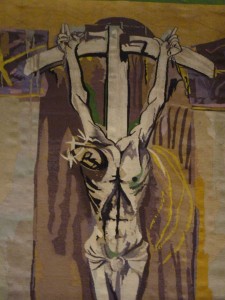 Jesus Meets All Creatures in the Flesh
Jesus Meets All Creatures in the Flesh
Flesh, is the element Jesus shares most fully with humanity.
Yet in putting on this flesh, Christ shared many creaturely experiences that are common to animals across a wide spectrum of species.
Pain, Hunger, Happiness, Sorrow, Sickness, Bereavement, Joy.
Christ felt as the flesh of all things feel.
This flesh, common to all creatures, is the basis of the incarnation.
God incarnate was defined not by the characteristics of the flesh (brown eyes, dark hair, skin tone, etc.) but its essential fleshly character.
To think of Christ’s flesh being the flesh of all creatures is not to level out humanity with the rest of the animals.
Rather it underlines the interdependence of God’s creatures and the community of all earthly life which was made together,
blessed together
and lives together.
The flesh of which is shared by Christ.
 The Impact of the Cross
The Impact of the Cross
Genesis describes how the cosmic consequences of the fall are responsible for bringing pain and death to all creatures of this world.
Yet the work of Christ has an equally universal impact upon creation.
For in Christ, God embraces all fleshly woes, taking the pain and sin of the world upon Himself.
The flesh of the world which hung on the cross was made new by the cross and sanctified in the presence of the Spirit.
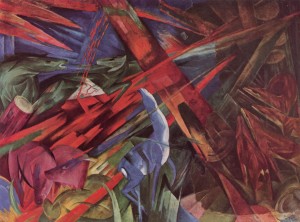 God Present with the Animals Today
God Present with the Animals Today
Flesh entails the necessity of pain and suffering.
Pain is an essential tool of survival yet is terrible sensation for any sentient creature.
The terribleness is and should be a source of great challenge and mystery, particularly the suffering of the innocent.
Yet made in love, by love and for love; no creature is born, lives or dies without love.
The God who gathered all things to Himself, is with all creatures in the fullness of their struggles and pain here and now.
Where there is suffering at any abattoir, bullring, fox hunt, animal testing laboratory and fur farm, there too is the suffering presence of God.
He really does know when every sparrow falls to the ground;
for He is there with the sparrow.
Love, the presence of God in the Spirit, not only suffers along with suffering creation but awaits to embrace and transform all life in the Kingdom of the resurrected Christ.
Acknowledgments:
- Alison Covey. Christianity and Animal Rights. Lecture at Regis College, University of Toronto. March 2014.
- Celia E. Deane-Drummond (Author, Editor), David Clough (Editor). Creaturely Theology: on God, Humans and other animals. SCM Press. 2009.
- Andrew Linzey. Animal Theology. University of Illinois Press. 1995.
- Brian McLaren (Afterword), Tripp York (Editor), Andy Alexis-Baker (Editor). A Faith Embracing All Creatures: Addressing Commonly Asked Questions about Christian Care for Animals (Peaceable Kingdom). Cascade Books. 2012.

